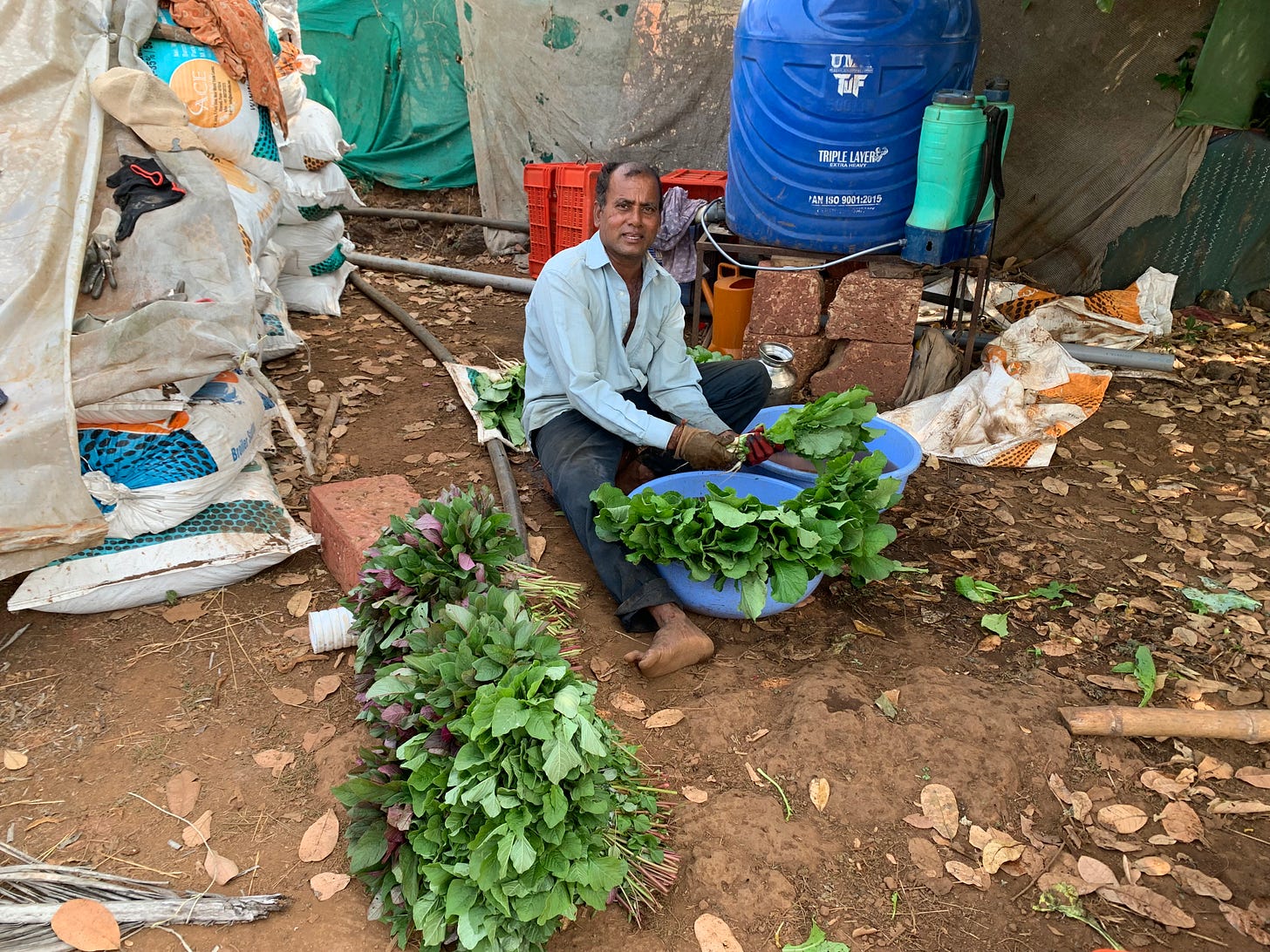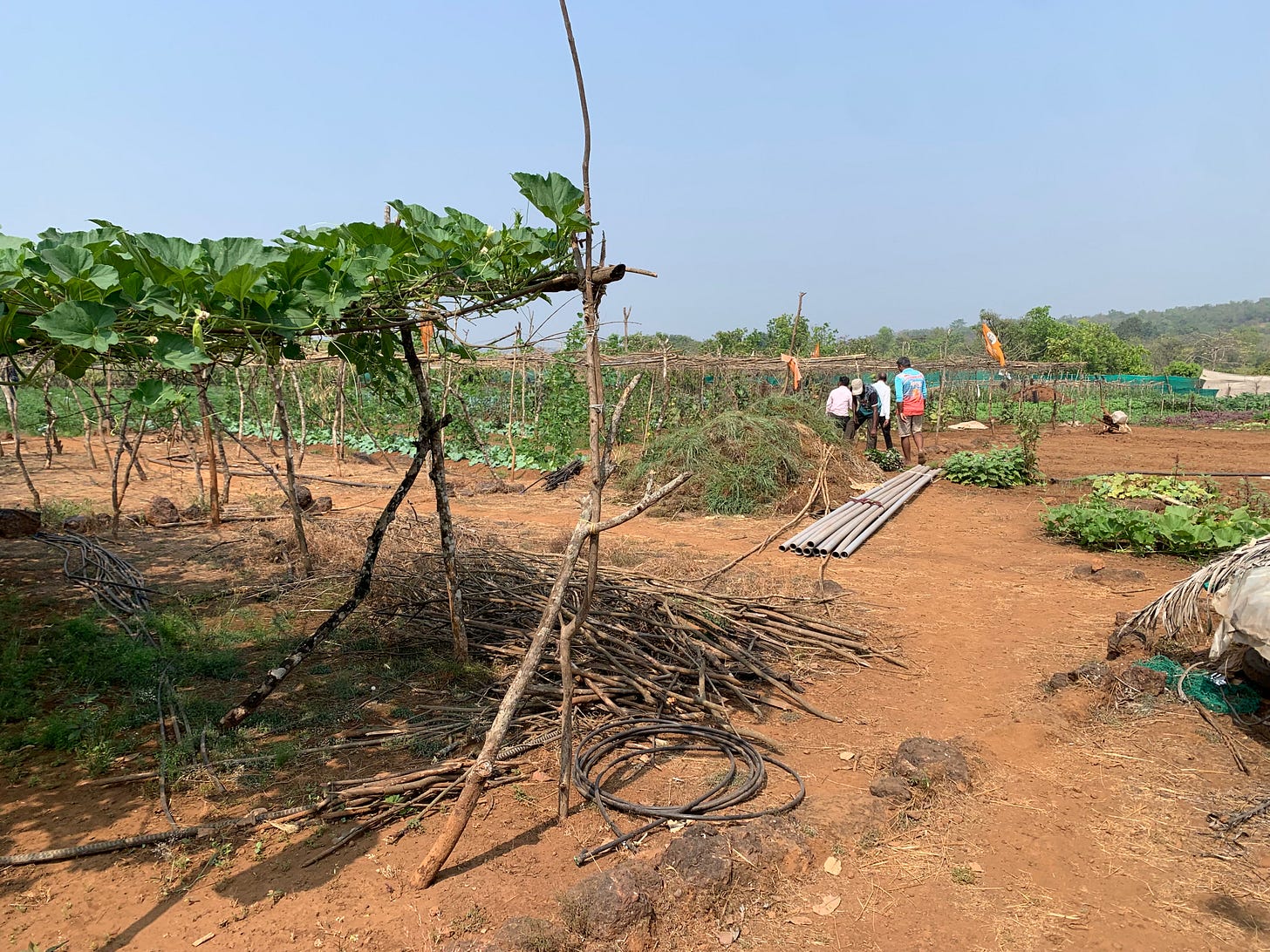Day 39: There are truly amazing examples all around us!
The residents of Ril devised a spectacular plan when the MIDC of Vatad was thrusted upon them, but I will come to that later. Firstly, the farmers of Vatad were extremely progressive in their ways of farming. They only needed some basic support from the government but the government only knows to bring projects which are in thousands of crores..
When we met the tailor who was supposed to speak to us about the farming techniques in Khandala and surrounding spaces, we would have never expected that this man would be part of a progressive farming community. He spoke to us about the different techniques they had devised to work with the land. He also told us how the MIDC was only brought in the name of progress, but like everywhere, this land too was owned partly by the ministers and their aides. Even the outgoing Chief Ministers name was thrown in the mix.
“When they bought the land, the person buying it would always tell us that we were here to grow mangoes. Mangoes were booming and thus many bought land under this pretext. But, suddenly we realised that 400 acres of land was bought off. Who bought it? Who sold it? Let’s not get into the particulars. All we know is, this is our ancestral land. We have worked with it, alongside it. If this is opened up to chemical factories— which it eventually will be, given its close distance to the creek, we will have no other option than to leave this place. Thus, we formed a group and decided to start working and forming FPO’s ourselves. I am a tailor by profession, but for the past few years, I have been working in the mango packaging and processing industry. We also bought a land within a group of people and we are now growing a variety of vegetables in an otherwise barren land.” His eyes were glimmering with hope and his face was that of a confident farmer.
“Can we go check the farm and speak with the other farmers?” I asked without wasting any time.
What I was seeing in front of me, was really incredible. The way they have cultivated beds on the laterite where there was not even an inch of soil, is really commendable. They brought in trucks of soil and then barricaded it with pieces of laterite which was usually the residue in mining. You would find almost every kind of vegetable, climbers, papaya, guava, mango amongst other produce. When asked what exactly pushed them to work on such a thing, he answered with a smile.
“We always thought that someone else will come do this for us, but we never thought that we could actually start this ourselves. One day all of us decided while we met on a tea break. Let’s build a model that will make people think differently about this land. One of us became the angel investor and others worked on the farm, as and when they could. The profits would be shared.” He knew that this idea which would have never seen the light of the day if they were to sit in their shops and only ponder about it, had finally come to life because of his effort.
“Let’s go though, I have to introduce you to someone who is even crazier than me,” he said promptly, kicking up his bike.
“Farms don’t produce vegetables. It is farmers who toil on the fields, which produces the yield. It is safe to say that farmers ripen the fruits and vegetables with their sweat.”
Varvatkar kaka was sitting in the shade, cleaning up the freshly cut vegetables when he said this. An otherwise barren land was turned into the Garden of Eden. I saw all kinds of vegetables— green leafy vegetables, cauliflower, lady fingers, coriander, muskmelon, watermelon— all this growing on a land that many of us would call barren, useless.
“I always wanted to be a farmer, but my dad did not leave me with any property of his own, thus I was forced to work as a labourer in the construction sites. While working as a ‘gavandi’, I used to ask the nearby farmers, about their techniques. They, out of jealousy, or whatever it maybe, would give me false information. They would tell me to simply throw the seeds on the ground and wait for the vegetables to come up.” He spoke with a smile on his face. His past memories were floating in his stream of thought.
“I was fed up. But then, when I was working in Waarna basin on a construction site, I made friends with a farmer. He became my guru. He taught me the nitty-gritty of farming. I also realised how the farmers in other areas of Maharashtra were helpful, but the farmers in Konkan were always laden with jealousy. Upon returning, I decided to go full in on farming. Because I didn’t have a land, I decided to take this land on a lease. Then I realised that there wasn’t any water here. Plus, because it wasn’t my land, I couldn’t really find a way to build a water source here. Upon thinking it through, my wife and I decided to dig a well in our backyard, which is some 850 meters away, at the bottom of this hill. I didn’t even have enough money to bring the water all the way up to this place, but I was adamant. I convinced a dealer to provide me with pipes. He too agreed when I paid some 25% in advance.
…and finally there was water!”
I could see the sense of accomplishment on his face and why shouldn’t he be proud? Against all odds he had successfully created a farm which was paying him well.
When I met him, his monthly income was around 60-80,000 rupees. Subtracting all the costs, he was in a good enough position at the end of the day. His son too had recently returned after studying BSc. Agriculture. He too was toiling on the field with his father and mother. His work had grown so much that he had to employ two more people to work on his field. I would like to remind you, that all this is on a barren laterite, which had no more than 2-6 inches of soil on most parts.
The proposed MIDC for chemical factories is based in this very land where Varvatkar kaka grows his veggies. How can his model of growth, not be recognized at all? Why can’t he be the engine that shows the rest of the carriages a good way ahead?
Now back to the people of Ril. When the people of this area realised that there was nothing they could do, they went to the concerning minister and requested him to either take away their entire land and give them no compensation whatsoever. We would happily leave this place. But if they were going to bring any companies then they should come under the flag of a green zone. If you really want our progress, give us funds for tourism, give us better machines for farming. Empower us and let us farm, don’t give us free money for our land.
The result was astonishing. Given such a non-violent protest from the people of Ril, Vatad and Khandala, the minister had to put a stay order for the time being. Again, this is not the end, but this is definitely a positive sign. We have a lot of power when we protest non-violently and stay together.
I have now walked 2/3rd of my Konkan Coastal walk and now I am entering the third phase. I haven’t forgotten about the postcards. I will post them as soon as I get some free time. Thanks for your continual support!!
Thank you for the help provided so far and for being a part of this walk! I now have a team assisting me and if financial support can be provided to keep them going, then please do so. here’s the link
For Indians who want to support'/contribute, here is the UPI payment number GPay or PhonePe- 8983726737
The idea of this walk is to highlight the issues, spread an ecological conscience within the people, listen to them and bring them together to see if we can bring about a change that can move towards a future that aids people rather than pushes them away from their homeland.
If you can help me by contributing for this walk, then please do, I could start a kickstarter or manage crowdfunding through some other website, but none of those options are available to me here in India. So, I will be dependant on your donations. You can contribute through paypal - here’s the link. I will send out a personalised postcard if the donations are above $30 and if it’s above $100 then whatever comes out of this walk - a book, a documentary or anything else - you will be the first ones to receive it.







